- Bernard Preston homepage
- Honey Mead
- How Much Alcohol Causes Cancer
How much alcohol causes cancer?
How much alcohol causes cancer is an unsettling question but it does need to be faced if we want to live long in the land. Happily there is a way out. There are sound reasons to believe that natural wines, meads and beers full of probiotics may be exceptions to the rule.
"There is an urgent need to raise global awareness about the direct link between alcohol consumption and cancer risk."
- International Agency for Research on Cancer
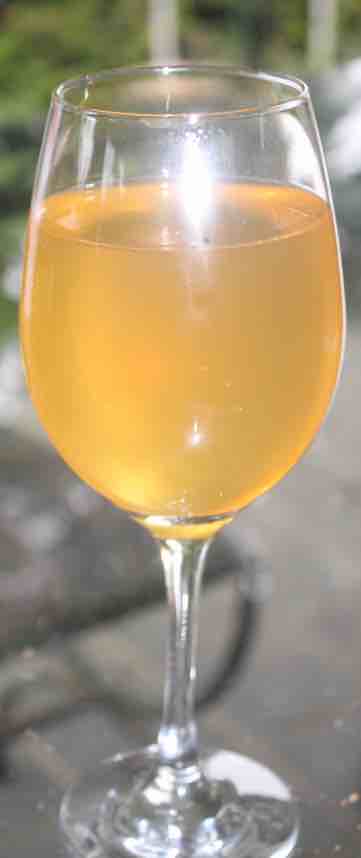
What is the first line of attack?
I was very excited but also depressed when I read the headline "Second-Line Treatment of Renal Cell Carcinoma" in a prestigious medical journal; the first of course being chemotherapy.
Also interesting were others in the same series like "How Does the Gut Microbiome Impact Response to Cancer Therapy?[1]" This research is not from alternative healthcare but mainline medicine; this discussion is by two oncologists from prestigious treatment centres.
So why did it make me depressed at first sight? Because the assumption is that many of us are going to get cancer anyway; one in six deaths worldwide. And it's significantly higher amongst those who drink even small amounts of commercial alcohol.
Attack remains the best form of defense; and that means aggressively following a policy of prevention.
Prevention is the best form of defense
Prevention is the overwhelming best form of defense but mostly what we are hearing is about screenings and modern types of chemotherapy; that's what made me depressed.
The first line of treatment should be prevention; not catching it early with screenings.
The second line of treatment too should be prevention; not advanced new drugs.
And that means we can no longer be ostriches, burying our heads in the sand and denying that there is a strong causal link between cancer and lifestyle.
Did you know that an ostrich's eye is bigger than its brain?
However the honest truth according to IARC data is that alcohol accounts for only 4% of all cancers; that might seem pretty low. Yet it amounts to 17,000 new cases of malignant tumours each year in the UK alone directly from booze; that's a lot of ostriches.
Half of them are those who are heavy drinkers; six or more shots per day.
Even one alcoholic drink a week does increase the risk of breast cancer.
Yet no research has been done on how natural wines and beers affect the prevalence of cancer. They are hard to come by and expensive; unless you decide to become a brewer yourself. So scientists have not considered what influence our meads might be having; for better or for worse.
Drinkers
- Heavy
- Risky
- Moderate
Ethanol
- > 60g / day
- 20 - 60g / day
- < 20g / day
No. of drinks
- > 6 / day
- 2 - 6 / day
- < 2 / day
IARC
A presentation in 2023 to the International Agency for Research on Cancer concerned the "urgent need to raise global awareness about the direct link between alcohol consumption and the risk of malignant tumours[2]." The work was done in France where the average tippler enjoys 2 bottles of wine per week; about 10 glasses. Overall the French are moderate drinkers.
That's about how much mead I drink every week; I am in the moderate group. Am I at risk?
A "standard" drink is defined as follow.
- 12 oz of beer, cooler or cider (5% alcohol); 360 ml.
- 5 oz
of wine (12% alcohol); 150 ml.
- 1.5 oz of spirits such as whiskey, vodka or
gin (40% alcohol); 450 ml.
Lifestyle
These lifestyle behaviours are additive. Drinkers who are also smokers, eat little food rich in anti-oxidants and do not exercise are at far greater risk. So are the obese; and those exposed to environmental pollutants which is virtually all of us.
Those who choose not to give up drinking despite the risks could significantly shift the odds in their favour simply by enjoying a lunch like this.
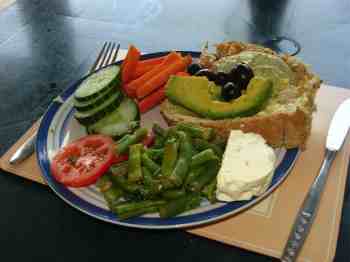
Adding one true whole grain per day would further reduce the risk of breast cancer, for example by nearly 50%. It takes only five minutes to prepare the ingredients for a sourdough loaf made in a bread machine. However acquiring 100pc real flour is difficult.
Even the best commercial bread would not give the same protection against cancer.
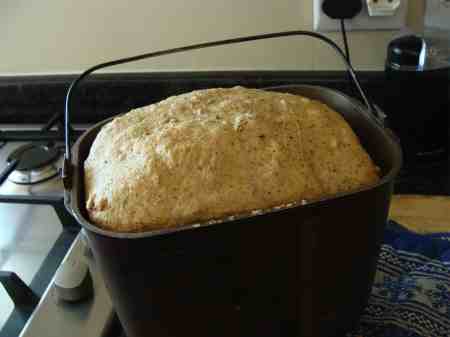
Blue Zones
There are five places where ten times as many people live to enjoy full, zestful old age; yet in four of them they are moderate drinkers. Two or three glasses of wine every day is the norm; the alcohol does not appear to affect them like the rest of the world. The exception is in Lima Loma where the Adventists are tea teetotalers.
In part it's about their lifestyle; but also the wine they enjoy with their meals is not the typical alcohol most of us drink. It is brewed locally; it is not pasteurised nor are any preservatives added.
Natural alcohol as it is being called, is hard to find and expensive. For those who seriously enjoy their tipple, are unwilling to give it up yet are concerned about the risk of cancer, becoming a brewer is an option.
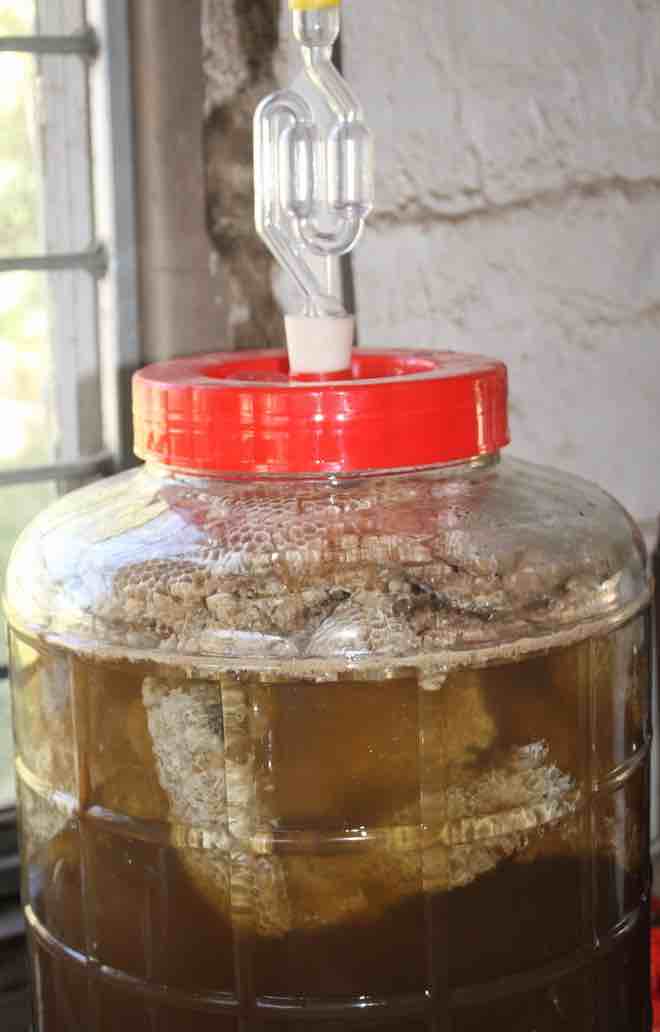 Honey mead in a 23 litre carboy
Honey mead in a 23 litre carboyIkaria is one of the Blue Zone islands in the Mediterranean; there are many beekeepers. They brew their own mead.
Journeying with alcohol
Most of us flirt with alcohol; I am no exception. For most of my life I have enjoyed 2 - 4 beers daily. I rarely drink during the day, do not get drunk but do consume too much booze.
That makes me what is called a "functional alcoholic."
Finally after firmly facing the fact that I was a "risky drinker" I decided to start brewing. The first phase of my journey with alcohol was decidedly detrimental to my overall wellbeing; yet kept the Big C at bay either by good fortune or an otherwise healthy lifestyle.
The second part of the journey has been profoundly interesting. First brewing my own beer but using a commercial, suspect concoction; finally, being a beekeeper I turned to mead.
Brewing my own beer I found tiresome and expensive; the bottling in particular was unpleasant. And I was unsure what was put into the starter mixture that I was buying; it had a metallic taste. Mead has been entirely more rewarding in every sense but only because I am also a keeper.
So I could perhaps call myself a disciple of the apiarists and meaders of Ikaria. The overall lifestyle of those Blue Zone people has consumed me. All naturally brewed wine and beer is rich in probiotics and entirely different to the commercial alcohol that we are accustomed to.
I have no research to prove it; there are so few consumers of natural wines and beers that it would be extremely difficult to do a study on how much alcohol causes cancer in their lives. But it is my profound belief that the mead I brew is actually good for me; in moderation.
Too much alcohol of even the best sort can still destroy a life.
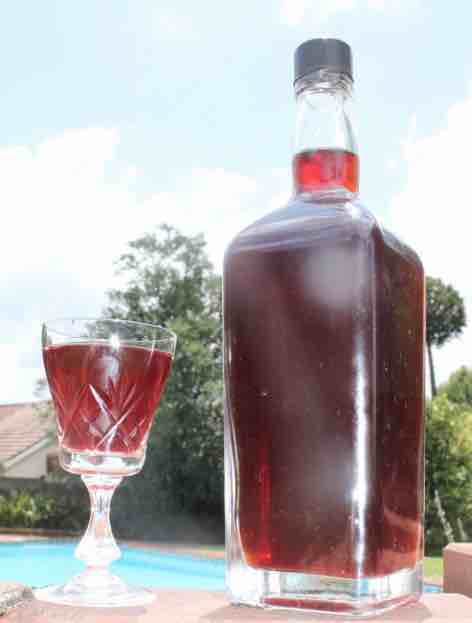 Glass of mulberry honey mead.
Glass of mulberry honey mead.I am no long anxious about enjoying about two bottles per week. This mead made with mulberries is profoundly interesting; technically it's called a melomel. You will not find it commercially; consider becoming a brewer. I whole-heartedly endorse it.
You could use any kind of berries. I experiment with many; but these are easy to grow and pick.
You can benefit from all the nutrients in berries. The research is unequivocal; they are good for us.
But still how much alcohol causes cancer remains a disturbing question for all of us.
Take home
The "take home" from this is that alcohol as we all know only too well, comes with significant dangers. For those tipplers who really do want to enjoy healthy old age, free of cancer and are willing to ring in some changes to their lifestyle, becoming a brewer is a good option.
There is good reason to believe that the natural vs commercial wine and mead debate does have something to contribute to our options.
In the meantime researchers are adamant that tobacco, obesity and alcohol are the leading preventable causes of cancer.
Alcohol and other diseases
Much as I think that organic, unpasteurised and unsterilised vintages are reasonably safe and even as a probiotic healthy, we cannot disregard the weight of medical opinion coming out from the research that alcohol undermines much of wellness.
Not just cancer but it plays a role in fatty liver disease, obesity and sleep disorders too.
How much alcohol causes cancer? And what about anxiety, depression and cognitive decline too?
Is it the alcohol or all the other toxic chemicals that come with commercial wines and beers? We live and die by our choices; each much follow his or her own guiding star.
How much alcohol causes cancer?
How much alcohol causes cancer is a disturbing question. Almost 50 people die every day of the year in the UK alone from a malignant tumour directly from their drinking. That's not small beer.
When browsing use right click and "Open Link in New Tab" or you may get a bad gateway signal.
Newsletter
Our newsletter is entitled "create a cyan zone" at your home, preserving both yourself and Mother Earth for future generations; and the family too, of course. We promise not to spam you with daily emails promoting various products. You may get an occasional nudge to buy one of my books.
Here are the back issues.
- Lifestyle and ideal body weight
- What are ultra-processed foods?
- Investing in long-term health
- Diseases from plastic exposure
- Intensive lifestyle management for obesity has limited value
- A world largely devoid of Parkinson's Disease
- The impact of friendly bacteria in the tum on the prevention of cancer
- There's a hole in the bucket
- Everyone is talking about weight loss drugs
- Pull the sweet tooth
- If you suffer from heartburn plant a susu
- Refined maize meal and stunting
- Should agriculture and industry get priority for water and electricity?
- Nature is calling
- Mill your own flour
- Bake your own sourdough bread
- Microplastics from our water
- Alternative types of water storage
- Wear your clothes out
- Comfort foods
- Create a bee-friendly environment
- Go to bed slightly hungry
- Keep bees
- Blue zone folk are religious
- Reduce plastic waste
- Family is important
- What can go in compost?
- Grow broad beans for longevity
- Harvest and store sunshine
- Blue zone exercise
- Harvest and store your rainwater
- Create a cyan zone at your home
Did you find this page interesting? How about forwarding it to a friendly book or food junkie? Better still, a social media tick would help.
- Bernard Preston homepage
- Honey Mead
- How Much Alcohol Causes Cancer
Address:
56 Groenekloof Rd,
Hilton, KZN
South Africa
Website:
https://www.bernard-preston.com